#47 Elvire Roberts, poet
'I am a morning writer all the way through the first 90 degrees of sunlight'
Elvire Roberts is an LGBTQ+ poet living in Nottingham (UK), working as a British Sign Language/English interpreter. Her work has been featured in journals including 14 Magazine, Dark Mountain, Finished Creatures, Magma, Reliquiae, The Rialto, Tentacular, and the anthologies Ten Poems About Getting Older and Apocalyptic Landscape. Most recently, she was shortlisted for the 2024 Aesthetica Creative Writing Award. She performs many of her poems from memory. She has a solo debut pamphlet, North by Northnorth, and a collaborative pamphlet, Knee to Knee, co-written with Rachel Goodman.
Where do you write?
Anywhere and everywhere: waiting at work, walking in the woods, in cafés, at the middle room table where most of my lounging / nibbling / reading / chuntering takes place. I live in a traditional British working-class terraced house, where the middle room was the main family room and the front room kept as ‘best’ - a parlour for guests. My guests include poetry books.
I have the luxury of two desks, but one is for work and horizontal filing of poetry notes, and the other is for books on their way in/out. I might edit them, but I rarely write there.
What can we always find on your desk?
Scribbles, burnt matches, spectacles, ink, scraps of paper-in-waiting, aromatherapy candles, a Blackwing pencil, and numerous fountain pens. The latter is a mild addiction sparked by restoring my grandma’s lever-fill fountain pen, whose sac was replaced by Battersea Pen Home.
Morning writer or late-night words?
I can edit at pretty much any time, and my brain often annoyingly fiddles with edits in the middle of the night, but for fresh writing and first drafts, I am a morning writer all the way through the first 90 degrees of sunlight.
Coffee, tea, nibbles?
Only if I need to stretch my legs and move the poem. Otherwise, it’s water in a copper flask and maybe an apple, if I remember. Once I’m in the poem, there’s nothing else. As the smell of carbonised homemade granola testified yesterday.
What are your most tempting distractions?
Coffee with friends and work admin. The first I welcome and will rarely refuse, the other a tide of ‘should’ with eyes rolled.
What's that we hear on the speakers?
My neighbour’s music coming through the walls! I used to be able to shut off any background sounds, but with the menopause, I’ve lost that superpower and become more sensitive. I now can’t write in cafés where music is louder than normal speech. For first drafts, I need silence to listen to internal patterns and movements. I have no ear for music, but instead, I have a very strong physical sense of both rhythm and scansion in free verse.
Have you got any pre-writing rituals?
I often use images as starting points, mid-points, swords, and dreamings, so I have pictures on my walls and tranklements (bibelots) on my windowsills that take me places.
Perfect bookshop to hide on a rainy day?
Five Leaves Bookshop in Nottingham is a dangerous place where books sneak into my hand, and conversations lead to recommendations, and before I know it, my empty bag is full. If you need to linger longer, then Scarthin Books in Cromford has an excellent café with a magical rotating door of a bookshelf.
What's your most treasured book?
There are some belovéd childhood books, but my friend, the poet and artist Jane Wheeler, made me a book of her wren poems, The Trouble with Wren, which is exquisite and irreplaceable.
Favourite word?
It changes from week to week. I’m currently enjoying the Northern Irish sign CHRISTMAS, where one hand moves from making a ‘beard’ shape on the chin to stamping it on the palm of the other hand.
Dream writing location?
The middle of nowhere.
Three writers (dead or alive) to have dinner with?
Sappho, Dionne Brand, and Tove Jansson - although I’d no doubt be very quiet and somewhat overawed.
One poem that has changed your life:
Throughout my school years, we were given white male poets to read. Sylvia Plath was the first writer to make me realise that poetry could speak to my own experience as a young woman with mental health issues. ‘The Moon and the Yew Tree’ burned into me like no other poetry had.



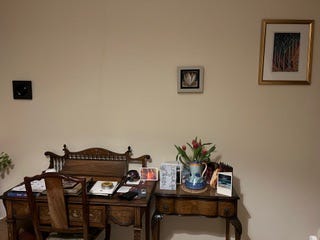
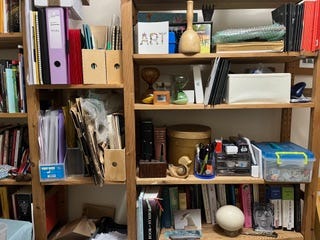
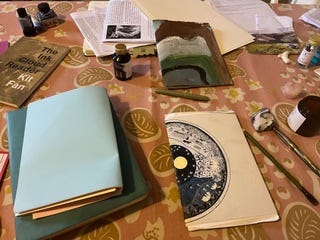
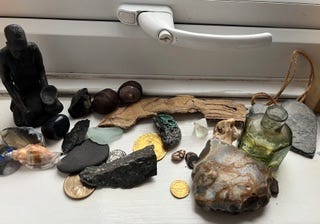
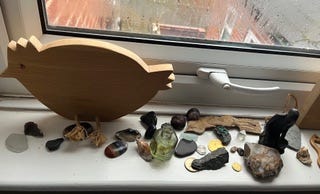
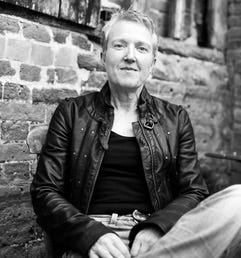
Gostei da escrita rica e precisa da autora do texto dada a artista plástica Maria Amélia e a cultura do Nordeste do Brasil, celeiro de arte genuína.